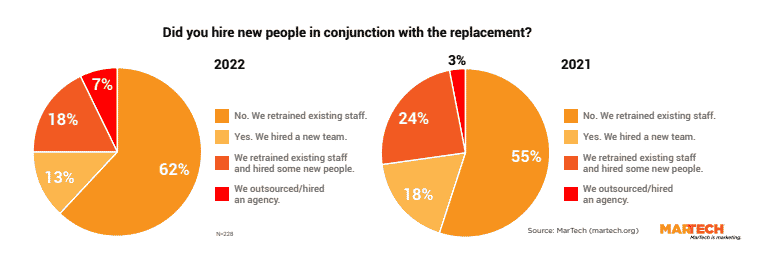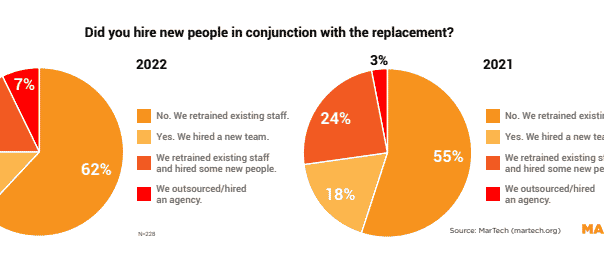Who makes the decisions when it comes to replacing martech solutions, and how are those decisions implemented?
Based on the 2022 MarTech Replacement Survey, we’ve seen that marketing organizations replaced marketing automation and CRM more often than other solutions, with SEO in third place. We also know that replacements, whether of homegrown or commercial applications, were driven by a need for better features, especially integration capabilities, data management and ability to show ROI.
Let’s look now at how those decisions were made, and at some of the implications.
The replacement champions
As in previous years, marketing management led the pack in championing replacement decisions – 38% in 2022 compared to 39% in 2021. And about 21% said executive management championed the decision, compared to 29% last year.
The level of executive involvement in the decision to replace marketing software, second only to marketing management, surely demonstrates its mission-critical nature.
Matters were different for smaller companies, where executives were the champions for 37% of the respondents, with marketing management in second place (29%).

The role of MOps
Perhaps surprisingly, marketing operations continues to have a lesser role in these decisions. It led the charge in 17% of cases, followed by IT (12%) and marketing staff (11%).
If you really think about it, the marketing operations maestros who manage these systems and train marketers on using them should be the dominant champions. They’re not, but this year’s data show their voices getting louder.
The 17% of MOps champions dropped to 11% for small companies, but small organizations are far less likely to have dedicated marketing operations teams. On the other hand, about 22% of marketers from mid-sized companies said MOps championed these decisions and 24% from large enterprises said the same thing.
Training or hiring?
We also looked at whether new teams were brought in to manage the newly acquired solutions.

The first time we fielded the Replacement Survey, 43% of respondents said they hired new teams to manage new software. But the pandemic upended that. This year, 62% of respondents said they retrained existing staff to manage the new platforms, an increase compared to the 55% in the 2021 survey. Only 13% said they hired a new team to manage the new applications.
The top takeaway from the survey
Overall, the survey found that marketers and their employers are eager to replace mission-critical applications for the capabilities and features promised by alternatives. The thousands of commercial applications in the martech space are making the internal development of marketing software increasingly less attractive to most organizations.
The investment in martech software companies has fueled the innovation and specialization, enabling a virtuous circle of more capabilities, more choice and lower price for marketers. We predict those conditions will continue – despite consolidations of marketing software players. And marketers
and their organizations – and most importantly their customers — will continue to be empowered by it.
The post MarTech Replacement Survey: Who are the champions? appeared first on MarTech.
(25)
Report Post





